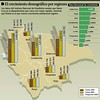Gerrymandering
09.27.2005Technorati tag: Bolivia

![]() The seat redistribution debate — following the constitutional tribunal's decision — continues in Bolivia. So far, there are three positions on the evolving debate:
The seat redistribution debate — following the constitutional tribunal's decision — continues in Bolivia. So far, there are three positions on the evolving debate:
La Paz, Oruro, and Potosí: Legislators from these three departments demand convocation of a constituent assembly (which also require some sort of election, thus only prolonging the problem) to decide the issue of seat distribution. They've threatened to block elections under the new seat redistribution.
Santa Cruz: The department's brigada parlamentaria proposed a compromise solution to modify articles 87 & 88 of the Electoral Code, giving a minimum of 5 seats to each of the smaller & poorer departments, but using the 2001 census as a guide.
Cochabamba, Chuquisaca, Tarija, Beni, and Pando: These departments' legislative caucuses have no formal position (yet), except that the tribunal's decision should be respected, but w/o disrupting the upcoming elections.
The question of seat distribution is a hot topic, because of Bolivian migration & population patterns. By law, seats are allocated on a departmental basis, taking population into account. Unlike the Senate, which gives each department three seats (regardless of population), the House of Deputies gives each department a number of legislative seats on the basis of that department's share of the national population.
For several decades, Bolivians have been migrating from the highlands (which are poor) to the lowlands (where the economic is consistently growing). This has made the city of Santa Cruz grow from a provincial capital to the largest metropolitan area in the country (1.4 million) — in my lifetime. The departments of Potosí & Oruro have been been especially hit, as the former mining centers closed down. The largest recipients of these new immigrants have been Cochabamba & Santa Cruz.
Evo Morales & MAS are, in large measure, a product of this shift. The cocalero movement is made up principally of new immigrants from Oruro to the tropical valleys of Cochabamba. They brought their Totskyite-syndicalism w/ them, forming a powerful rural syndicalist movement which later became MAS.
The last two decades of Bolivian electoral politics have also shown the growing ascendancy of the (new) Santa Cruz bourgeoisie. Whereas previous Bolivian politics centered around La Paz — w/ a combination of established elites & populism — the realities of electoral redistribution have made formerly (electorally) insignificant departments into large powerhouses. (Think California, which in a few decades went from a dusty Western state to one of the largest block of electoral college votes in the US electorate.)
The debate over seat distribution has to be taken in this context. The law stipulates that lower house representation is population-based. It's an abstract decision; X number of people are represented by 1 legislator. In other words: a vote in Potosí should be the same as a vote in Santa Cruz. Otherwise, we're gerrymandering. Now, there may be good reasons to gerrymander. That's a political decision to be made through negotiation. But one shouldn't be blind to that simple fact: What regional leaders from La Paz, Oruro, and Potosí are demanding is gerrymandering.
----
NOTE: Specifically, this is malaportionment, which is a type of gerrymandering where some districts are overrepresented (given more representatives than they otherwise would if rules were equitative) and others are underrepresented (given less representatives than they otherwise would if rules were equitative). When malaportionment is done on purpose — to make a certain electoral outcome more likely — it falls under the category of gerrymandering.
Posted by Miguel at 06:31 PM
Comments
As a geek who likes details about electoral systems, I appreciate the post :)
Posted by: boz at September 27, 2005 06:56 PM
It is incredible to me how little understanding there is in Congress of what it means to be living in a state where the law is the law.
If there is a problem of malapportionment in the Bolivian Congress, then this problem should be resolved by debate and some amendments. It is not for the Congressmen (from La Paz, Potosi and Oruro) to sabotage the elections or block the roads.
Posted by: Miguel at September 28, 2005 12:05 PM
It may seem logical to think that it's the same voters, but they happen to now live in another region of the country. Perhaps they would vote as they would if they still lived in Potosi.
But I think as they move to the other part of the country, they also adopt the characteristics of those in Santa Cruz (who usually vote with the traditional political parties).
Posted by: eduardo at September 28, 2005 05:19 PM